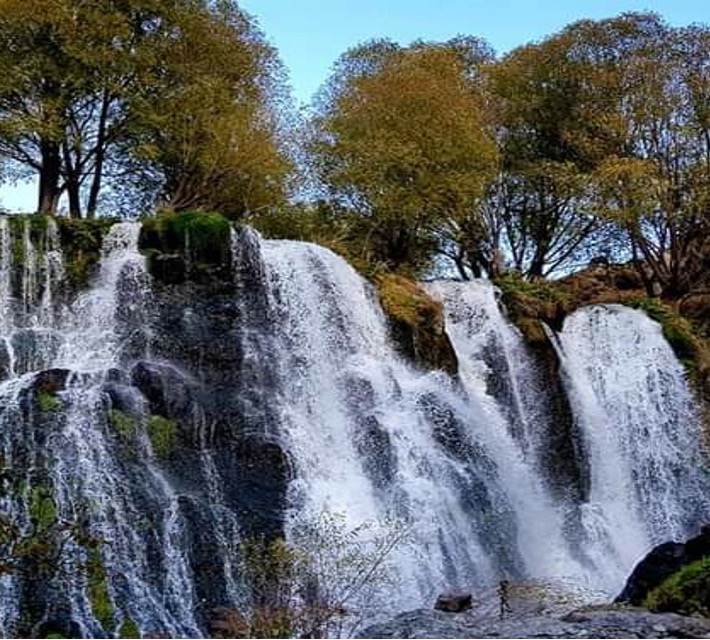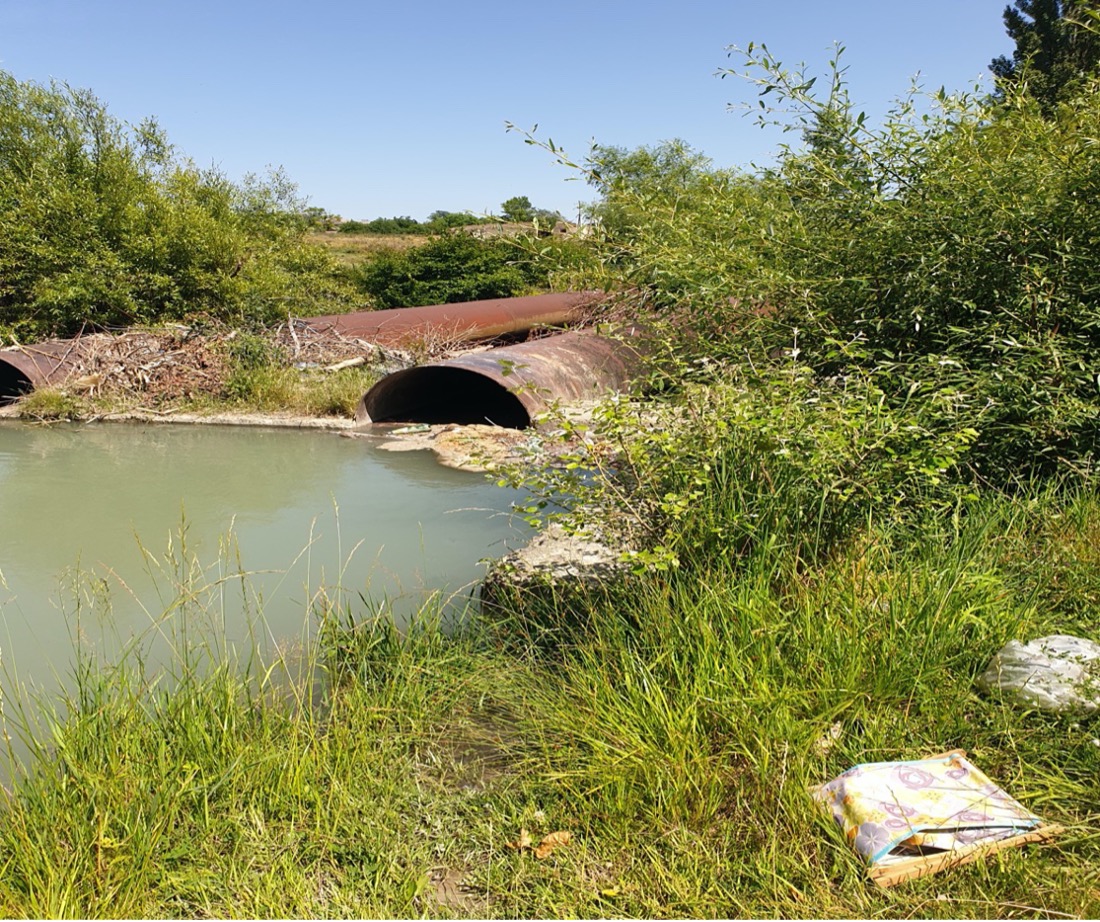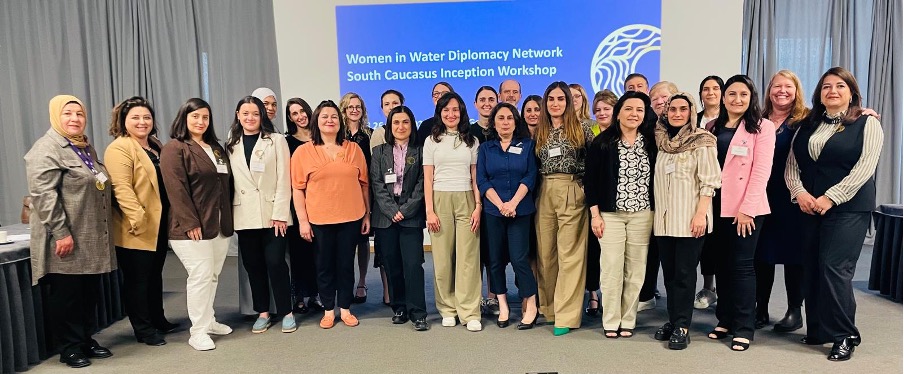Blogposts
Linking Women, Water and Peace: Promoting Women in Water Diplomacy South Caucasus
Róisín Burke

Shaki Waterfall, Syunik, Armenia
Water does not know boundaries, it ebbs and flows between people, communities, states, time and generations. Globally, water is deeply connected to place, people, history, spirituality, daily life, basic needs, human rights, movement, recreation, sovereignty, industry, economy, and power. Upstream and downstream states are unavoidably interconnected. There is a significant amount of water on the earth, however, only 2.53% of this is fresh water and much of it is groundwater or contained in ice, rendering it less accessible. Water insecurity is likely to increase globally in the coming years, particularly in light of climate change. Approximately 36% of the world’s population reside in areas where water is already a scarcity. UN Secretary-General, Guterres, in 2017 called on states to “commit to investing in water security to ensure durable peace and security…”. In this piece we will consider water as an entry point for cooperation in the South Caucasus context, and women in this water diplomacy space. A UN Women study of 31 peace processes (1992 to 2011) highlighted that women were only: 4% of signatories of peace agreements, 2.4% of lead mediators, and 9% of negotiators. Yet, studies indicate that women are involved in peace negotiations, agreements tend to be significantly more sustainable, and that they tend to prioritise issues that affect communities and youth. There is also increasing recognition for women’s voices in water diplomacy, including in areas affected by conflict.
The South Caucasus (Armenia, Azerbaijan and Georgia) has long been plagued with territorial and ethnic conflicts, not least since the fall of the USSR. The water of the Kura-Araks River Basin is shared between Turkey, Georgia, Armenia, Azerbaijan, and Iran. The Araks and Kura rivers originate in Turkey and end in the Caspian Sea. Armenia, Azerbaijan, and Georgia rely heavily on the Kura-Araks river basin and sub-basins for surface water, industrial, agricultural, and drinking water. Subsistence and semi-subsistence farming is prominent throughout the South Caucasus. During Soviet times a series of bilateral treaties were made been Moscow, Turkey, and Iran to regulate the usage of these rivers. This system ended with the fall the USSR, which was accompanied by the outbreak of war between Armenia and Azerbaijan. Dilapated infrastructure, increasing levels of commercial agriculture, construction of hydroelectric dams, industrial waste, pollutants, climate change, and water management weaknesses place pressure on water throughout the region. Turkey, upstream, plans to construct several new dams on the Kura and Araks rivers which is anticipated to majorly impact on downstream flows. Climate change is predicated to decrease precipitation, increase drought, melting glaciers, hail, floods, mudflows, soil erosion, and landslides.
The Enguri dam and hydropower plants in the area of the disputed territory of Abkhazia, and the Zonkari reservoir and the Tiriponi irrigation system in South Ossetia have caused tensions in Georgia but there is now some cooperation on water and irrigation systems. Tensions increased in recent years, with outbreaks of conflict in 2020 and 2022 between Azerbaijan and Armenia, followed by a 2024 border delimitation and peace process. In the months leading up to the 2020 conflict, there were significant water shortages in Azerbaijan. The then within Azerbaijan is home to important water resources. In 2022 clashes occurred close to Sev Lich, a reservoir in Armenia’s Syunik region. Water insecurity is likely to grow, with studies predicting severe water shortages in the region by 2040.
Environmental Peacebuilding and Water
To quote Wolf et al ‘rivalries over water have been the source of disputes since the Neolithic revolution…between 8000 and 6000 BC…“rivalry” comes from the Latin rivalis, or “one using the same river as another.’ Conflicts in the South Caucasus have numerous roots beyond what we can address here. Water does not cause conflict, but it may increase pressure. In the 1990s there was much scholarship predicting water wars, but this has largely been debunked. In reality state interactions regarding transboundary waters have a much greater tendency towards cooperation. Bruch et al refer to environmental peacebuilding as the ‘process of governing and managing natural resources and the environment to support durable peace’. Initiatives at a cooperative level in regard to water management, networks and infrastructure have in the past led to positive outcomes at a state-to-state or community level around the world, building confidence. With the signing of a peace agreement between Armenia and Azerbaijan, I hope this year, some would argue this may open more space for cooperation between states. Research highlights joint benefits of coordinated water resource management, including storage and power generation, and in adapting to climate change.
There have been intermittent engagements and projects between Armenia, Azerbaijan, and Georgia on water management issues over the years. Formal cooperation remains weak. There is no multilateral treaty covering the Kura-Araks river basin. There is an obvious need for cooperative approaches on water management at transboundary and intrastate levels, at some point needing to also include Turkey and Iran.
As an illustration of water’s use in confidence-building between communities, is cooperation on the water infrastructure cutting across the Administrative Boundary Line (ABL) in Georgia/South Ossetia. This took place following the Geneva International Discussions in 2010, facilitating access to water for those living in villages near the ABL, on both sides (the breakaway territory and Georgian state at least), partially due to advocacy of women living along the ABL and with support of actors such as a EU Monitoring Mission.

Water infrastructure on the ABL, Georgia
Women in Water Diplomacy
The human security of women and girls is increasingly at risk in areas where gender inequality, armed conflict, and climate change are prevalent. Women and men’s experiences in these environments often differ and gender inequality impacts on capacity to adapt. Access to water is core to human needs, and thereby security, effecting lives in numerous ways, e.g. food security, agriculture, employment, health, displacement, etc. In General Recommendation No. 37 the Convention on the Elimination of Discrimination Against Women (CEDAW) Committee stressed that lack of safe accessible water, places additional burdens on women, causing ‘physical hardship, increased exposure to violence and stress’. Women of course are not a homogenous group, and have diverse intersecting identities (e.g. gender, race, ethnicity, rural/urban, displacement, disability), which affect diverse women’s inclusion/exclusion from decision-making processes.
Women living along the ABL, between Georgia and South Ossetia, over the years have done much to highlight water access difficulties for communities on both sides of the ABL, spurring some cooperation between Georgian authorities and de facto authorities in South Ossetia. In a 2019 study, documenting the experiences of women on both sides of the Armenia-Azerbaijan border, women stressed challenges regarding access to water for irrigation and drinking.
There is increasing acknowledgement that water security needs to be considered in peace dialogues and confidence-building measures, including its gender dimensions. As stipulated in a 2022 White Paper on the Future of Environmental Peacebuilding: “Just as a diversity of species is needed in a landscape to ensure resilience and health, so too a diversity of voices and experience is essential if we are to build a resilient, dynamic ‘ecosystem’ for peace.”
In 2000 the UN Security Council adopted Resolution 1325, the first in a series of Women, Peace and Security Resolutions (WPS Agenda) which formally recognized the need for women’s participation in all peacebuilding activities. WPS resolutions are tools aimed at enhancing states’ adherence to their pre-existing human rights obligations, e.g. under CEDAW. The CEDAW Committee issued General Recommendation No. 30 on women in conflict prevention, conflict and post-conflict situations, reinforcing state obligations under WPS Agenda. In Security Council Resolution 2242 the UN Security Council recognised explicitly the connection between climate change and women’s security. The empowerment of women, the right to water, and the need for transboundary water cooperation are embedded in the UN Sustainable Development Goals and their targets, which stress water’s relationship to peace. In the past few year the Secretary General has stressed in his annual reports on WPS (e.g. 2021 Report on Women Peace and Security) the relationship between gender, peacebuilding, natural resource management, climate change and security. With regards to women’s participation in decision-making on environmental issues, including water, we are starting to see states make explicit commitments under their WPS National Action Plans.
Women often have different ways of knowing the lived environment to men, given traditional labour divisions, within the household, farming, and in the community.The perceptions of women of natural resource management will often differ. Moreover, in peacebuilding, women are often operating close to communities, which can facilitate dialogue at a local level, changing narratives.
Heteronormative and patriarchal ideas frequently relegate women to the role of care givers within the household/family, and men that of bread-winners, soldiers, heads of household, land owners, decision-makers, or politicians. Stepping outside these roles can come with societal backlash. The absences of a critical mass of women voices are apparent in the peace and security field in the South Caucasus, particularly at formal levels. The OSCE, which has commenced transboundary water dialogue initiatives in the OSCE region given its security dimensions, has stressed the need for inclusion of women’s voices in water diplomacy. UNDP, UN Peacebuilding Support Office, UN Women and UNEP have supported various projects piloting natural resource-based interventions as a tool for strengthening women’s participation in conflict resolution, governance, and economic recovery.
Women in Water Diplomacy Network South Caucasus

April 2024, Women in Water Diplomacy Network South Caucasus Inception Workshop, Tbilisi, Georgia
As such, and building on research I am conducting on women peace and security, transboundary water and environmental peacebuilding as interconnected spaces, with Dutch Research Council (NWO) funding, I decided to instigate a conversation about establishing of a Women in Water Diplomacy Network South Caucasus with women from the region. An inception workshop was held in Tbilisi Georgia in April 2024, enabled through a continuing collaborative effort between Utrecht University, the Environmental Law Institute, and the South Caucasus Regional Water Management Programme of USAID.
The workshop explored the interconnections between women peace and security, transboundary water management and diplomacy and environmental peacebuilding. It covered topics ranging from river basin organisations mitigating tensions around water, international water law, regional water regulations, experiences of sister women in water diplomacy networks in the Nile Basin, Central Asia and elsewhere, and on a South Caucasus network.
Part of the goal was to simply connect participating women water security experts from the South Caucasus with one another, to network and engage views. To explore barriers and opportunities for women’s, including young women’s, meaningful participation in water dialogues and decision-making on transboundary and intrastate water in the South Caucasus. The intent was to provide a space to foster dialogue around water security, its gender dimensions, and women’s participation, and to better understand how women’s participation can be supported. Those attending were a mix between government, civil society and academic experts from the region, a third youth.
Networks such as this can provide constructive spaces for mutual learning and knowledge-exchange, trust building, instigating practical water-related cooperative initiatives, and to empower women in water diplomacy. They can provide critical spaces for mutual support and engagement which can be difficult to find in times where much needs to be done in building confidence within and between communities and states. There is now a growing global and regional women in water diplomacy community, and male supporters thereof. The Nile Basin Women in Water Diplomacy Network was established in 2017, founded by the Stockholm International Water Institute, in recognition of the underrepresentation of women in water diplomacy and climate negotiations. Other women in water diplomacy regional networks have since emerged and are interconnected, each with their own regional modes of operation and priorities.
What emerged from the April workshop, and over 20 research interviews conducted with experts in the region, is that such a Women in Water Diplomacy Network South Caucasus may serve a number of beneficial purposes. This includes, for example, providing an opportunity for women to connect, explore mutual challenges, and with a view to building future cross-border cooperation, correctly approached. Some Network members from across the South Caucasus have connected since April under different formats exploring cooperative spaces. Further events and initiatives are under planning for 2024 and 2025 as the Women in Water Diplomacy Network further establishes itself in the South Caucasus. In April, Lilit Baghdasaryan (Country Water Partnership) called on women experts to “rise above the region’s political divisions and invest in peacebuilding through water”, a stance echoed by other participants. History has often shown us that when we invest in women, we invest in peace.


